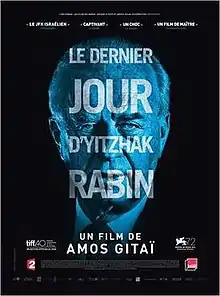Rabin, the Last Day
Rabin, the Last Day is a 2015 Israeli-French docudrama political thriller film[3][4] directed by Amos Gitai. It was selected to compete for the Golden Lion at the 72nd Venice International Film Festival.[5]
| Rabin, the Last Day | |
|---|---|
 French release poster | |
| Directed by | Amos Gitai |
| Written by | Amos Gitai Marie-José Sanselme |
| Produced by | Jean-Baptiste Dupont Cyril Colbeau-Justin Sylvie Pialat Francesco Di Silvio Amos Gitai |
| Cinematography | Eric Gautier |
| Edited by | Yuval Orr Tahel Sofer Isabelle Ingold |
| Music by | Amit Poznansky |
Production companies | |
| Distributed by | Le Pacte (France) |
Release dates |
|
Running time | 153 minutes[1] |
| Countries | Israel France |
| Languages | Hebrew English |
| Budget | $4.6 million[2] |
Premise
The film depicts the events surrounding the final days and assassination of Israeli Prime Minister Yitzhak Rabin.
Cast
- Yitzhak Hiskiya as chairman
- Pini Mittelman as commission member
- Michael Warshaviak as commission member
- Einat Weizman as commission lawyer
- Yogev Yefet as Rabin's murderer
- Tomer Sisley as Rabin's driver
- Rotem Keinan as commission lawyer
- Tomer Russo as hospital director
- Uri Gottlieb as attorney general
- Ruti Asarsai as police spokeswoman
- Dalia Shimko as psychiatrist
- Gdalya Besser as police officer
- Odelia More as teacher
- Eldad Prywes as Rabin's bodyguard
- Shalom Shmuelov as intelligence officer
- Mali Levi as journalist
- Stephen D. Root as journalist
- Liron Levo as soldier
- Yona Rosenkier as rallye driver
- Yael Abecassis as interviewer
- Shimon Peres as himself
Reception
Rabin, the Last Day has a score of 61% on Metacritic.[6] The Playlist gave the film a grade of B+, describing it as "deeply absorbing and intelligent".[7] The Hollywood Reporter wrote that the film "benefits from fine technical work throughout, from Eric Gautier's sober cinematography to a soulful musical theme by Amit Poznansky".[4] Jonathan Romney of Screendaily considered the film as one of Gitai's "most ambitious and compelling works yet", noting that the film's "slow, deliberate approach makes for a detached air which allows Gitai to show events with distinct clarity".[8]
References
- "Venezia 72". Venezia.
- "French Companies Back Amos Gitai's New Drama". Variety. 8 November 2014.
- "Venice entry 'Rabin, The Last Day' probes an Israeli trauma". Associated Press.
- "'Rabin, The Last Day': Venice Review". The Hollywood Reporter. 7 September 2015.
- "Venice Film Festival Unveils Star-Studded Lineup for 72nd Edition". The Hollywood Reporter. 29 July 2015.
- "Rabin, the Last Day". Metacritic.
- "Venice Review: Amos Gitai's Powerful, Political, Provocative 'Rabin: The Last Day'". The Playlist.
- "'Rabin, The Last Day': Review". Screendaily.
External links
Reviews
- A. O. Scott. (January 28, 2016).Review: Amos Gitai’s ‘Rabin, the Last Day’ Looks Back in Anguish. New York Times.
- J. Hoberman (January 26, 2016). ‘Rabin, The Last Day’ makes Oliver Stone's ‘JFK’ look stone-cold sober. Tablet
- Brandon Judell (January 2, 2016). Amos Gitai: With Rabin, The Last Day , Israel’s Godard Takes on Netanyahu, Extremist Rabbis, and an Artist’s Duty. HuffPost.
- Jill Lawless (8 September 2015). Venice entry ‘Rabin, The Last Day’ probes an Israeli trauma. Times of Israel.
- Thomas L. Friedman (September 23, 2015).
- Politicians Seeing Evil, Hearing Evil, Speaking Evil. New York Times.